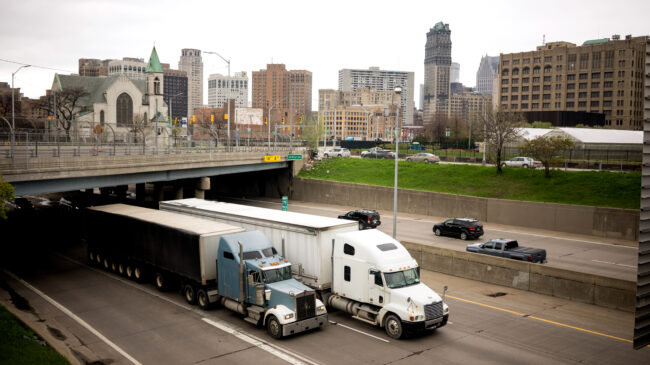Excerpt from Moving Michigan Forward: Replacing the fuel tax with mileage-based user fees
A transition from per-gallon fuel taxes to a mileage-based user fee system should be considered as a strategy to ensure adequate road funding for Michigan’s future.
This shift would apply to both gasoline taxes and diesel taxes. The objective should be not only to replace the former fuel tax revenue but also to remedy a number of other fuel tax shortcomings: their lack of transparency, lack of accountability of road providers to road users, and the fact that the current fuel tax works less like a user fee and more like just a conventional tax. The transition should focus on the benefits of improving Michigan’s aging and ailing highways as critically important to the state’s economic competitiveness.
The shift from fuel taxes to per-mile charges should be gradual. The best place to start is with limited-access highways, such as Interstates and other urban freeways. They could be converted to the MBUF system as a way to finance their reconstruction and modernization via issuing revenue bonds based on the projected user-fee revenues. The charges would be collected using a system such as the widely used and accepted E-ZPass, which uses prepaid accounts linked to windshield-mounted transponders in most cases. Customers would receive rebates based on the estimated fuel taxes they paid for the miles driven on roads using an MBUF. This would demonstrate that MBUFs are to be the replacement for fuel taxes, not an additional charge.
Converting the limited-access highways first would avoid many of the problems likely to be encountered by the pioneer states that attempt to convert all roads to MBUFs at the same time. Converting limited-access roads first would enable the Michigan Department of Transportation (MDOT) to avoid having to use decreasing fuel tax revenues for the very important tasks of rebuilding and then maintaining its Interstates and freeways. Over the next decade or two, MDOT could use most of its gas tax revenue on non-limited-access state and county roads to bring them up to a state of good repair.
By temporarily deferring the conversion of these other roads to per-mile charges, Michigan could learn from the successes and failures of other states, as they use current MBUF technologies to convert all their roads.
A decade or two from now, there will likely be better technologies and processes available for recording and reporting miles driven. In addition, much larger numbers of participants in other states should lead to reductions in the unit cost of processing mileage-based transactions.
In the near term, it would be wise for the state legislature and MDOT to plan for Michigan to take part in one of the federally funded MBUF pilot projects. It would be timely to have such a pilot project under way in the months following the release of the forthcoming MDOT study on the toll-financed reconstruction of interstates and other limited-access highways.
The pilot project would introduce a cross-section of the population (and potentially some elected officials) to the case for transitioning from the gas tax to per-mile charges. It would also support the case for starting the transition with proven technology and the modernization of Michigan’s most important highways.

